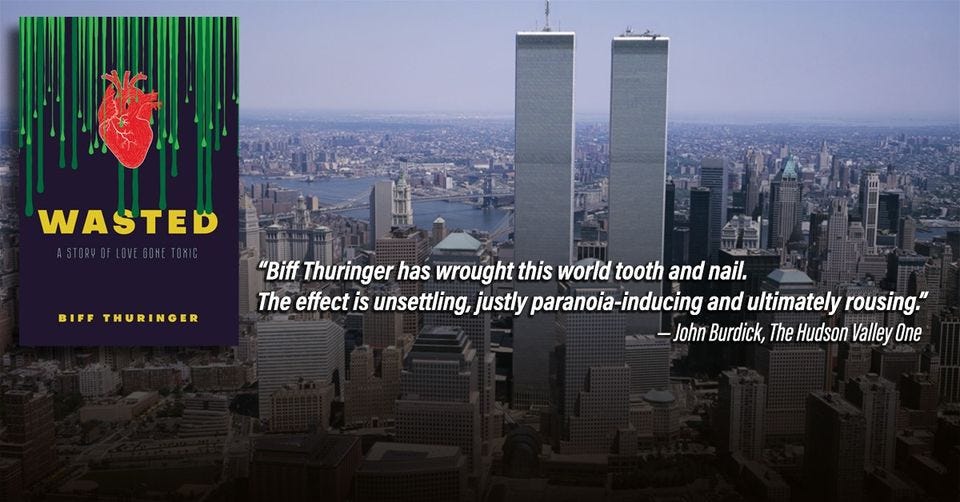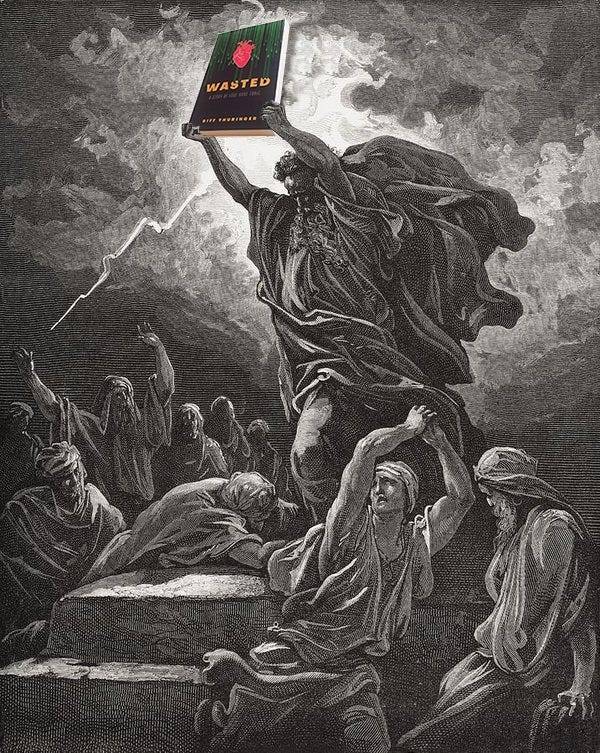Death Takes No Holiday: Chapter 9
Writing My Way Out of Trouble … and Right Back Into It
In writing the previous chapter about my journalism job interview, I might have skipped a few bars. Perhaps a small bit of housekeeping is in order.
The original Milo Z band – the edition with the Mercury record deal and the nationwide tours – broke up in 1996. Following that split, which was not exactly amicable, I remained in Manhattan for another year or so, making do. I got a job with my friend Lawrence, booking acts at a cavernous Bleecker Street emporium called Café a Go Go, where I was responsible for a diverse but not particularly successful lineup of shows. I booked Maria Muldaur, for instance, who bombed, and nearly bankrupted me. I booked the post-breakup Milo Z band for a few gigs, as well as Milo’s former band-mate Simon Chardiet and the Bar Sinisters for a few more. They both drew solidly, as did a band from Boston called Throat Culture and a few other decent acts. The highlight of that run was when I booked Motörhead to play for a Comedy Central party. They were, of course, great. Also, extremely loud. During sound check, Lemmy Kilmister produced the single loudest sound I’ve ever heard in my life. Louder than the dreaded Corrugator machine at Allied Container in Dedham, Mass, where I toiled in the early ’70s. Louder than the Ball Mill at Norlite Corp. in Cohoes, NY (also in the ’70s). Louder than a revving jet engine. My hearing still has not quite recovered, nearly 30 years later.
Meanwhile I engaged in other pursuits. I started bicycle messengering for Breakaway Couriers out of a SoHo loft office, riding my stolen and severely camouflaged Peugeot Manhattan at breakneck speeds up and down Manhattan, hitching rides by grasping the flanks of taxicabs and crosstown buses and figuring out ways to game the elevator systems in tall buildings. I also joined a pioneering pedicab operation started by the legendary George Bliss in the garage next to Hell’s Angels headquarters across the street from my old apartment on East Third Street. Besides being the best, most addictive exercise regimen I had ever engaged in, it was a serendipitous daily activity that resulted in some of the most colorful adventures of my life. I may skip back to this period in another chapter, but if I had to rank all the jobs I’ve toiled at in my life, driving a pedicab would rank somewhere in the top five.
Also firmly in the top five is journalism, generally … although some news organizations are far better places to work than others. Following the lifesaving interview described in the previous chapter, Bob Lomicky assigned me as a reporter to the Harlem Valley Times beat, under the tutelage of its smart-assed young editor, Bryan Viggiani, who shared a surname with my ex-wife and her late father, Nick “The Barber” Viggiani. Nick had died behind the wheel in 1989 in a horrible accident that also killed one of his four daughters. Their wake was attended by thousands, including a raft of alleged mobsters and New York Governor Mario Cuomo. Big Nick is another story I may or may not get to later in this missive, but it’s safe to say that Bryan, my new boss, had little in common with the man. He was, and still reportedly is, what they call a “mensch.”
The reporting job, which turned out to be a 60-to-80-hours-per-week affair, was a godsend. I threw myself into the work, reporting and writing news stories and opinion pieces, and tackling investigative projects that got me some not-altogether-welcome local and regional notoriety. I won a couple of New York Press Association writing awards, and in a year and a half steamed through various positions including the best job I ever had – editor at large, investigating and writing longer, more impactful regional stories – to reluctantly replace my savior Bob as executive editor. Which, to be frank, sucked. The papers had by then been sold by Meserve to the Journal Register Corporation, which was in the business of systematically buying and gutting daily and weekly newspapers all over the eastern and midwestern United States, and the fascist new owners had no use for a scruffy old bleeding-heart like Lomicky to be in charge of cutting costs, firing people and reducing the papers to Pennysavers.
Instead of beating my head against a wall during this dark period trying to save the papers from these rapacious vultures, I backed away from responsibility and immersed myself deep into a project investigating corruption and organized criminal activity in New York State. I took a 6-month leave of absence to go underground in pursuit of toxic waste black marketeers and their legal and political enablers, following mobbed-up trucks around, interviewing federal agents and rummaging through dusty files in town, county and state government offices. To support this doomed effort, I had applied for and gotten a $5,000 grant from The Nation Institute to complete a report. The report, titled “Adventures in Patakistan: Toxic Waste Dumping, Politics and the Mob in Upstate New York,” can be read on this Substack website. The editors of The Nation were ostensibly interested in me pursuing the story further, on the condition that New York Gov. George Pataki would be chosen by GW Bush as his running mate. I had a whole lot of dirt on the governor, whose dark history included a stint working in a mob-associated law firm in Peekskill. As his hoped-for selection did not happen, the story was considered “local” and no further investigations or stories on this subject were funded. An obsessive Don Quixote figure, I was far from pleased, and didn't exactly let go. The large-scale poisoning of millions of people for profit was and still is happening, all over the globe, and is still being managed by the same sort of people ... mobsters, unscrupulous business people and corrupt government officials. Trump is definitely one of them, as are a raft of politicians on both sides of our fake-assed national “divide.” There’s much more to that story, which I’ll get into in a bit.
Meanwhile, I went back to work at the newspaper and was “promoted” to a shittier job as executive editor of a larger, even more exploitable news chain in Connecticut. That job did not last long … about 8 months. Disillusioned with newspapering and beating my head against a wall, I got a job in NYC again, ghostwriting for an infamous but lazy satirist. That dude was an asshole, and after about a year I gave three weeks notice on August 29, 2001, my 49th birthday. A couple of weeks later I watched the towers fall from the seat of my trusty old bike near Union Square. It took about two seconds to realize that America was about to turn from a quasi-democratic, New World Order oligarchy into an unapologetic, proto-fascist police state. Back upstate in my new fiancee’s basement (we had met at Taconic Press), I wrote a heavily disguised thriller titled “Wasted: A Story of Love Gone Toxic”, using a lot of single-source, unverifiable stuff I couldn't include in the “Patakistan”report, and changing all the names, places and events to protect the innocent, the guilty, and anybody who still might want to chop me into little pieces. It took about six months to write the first draft. The minute I was done, I got a serendipitous call from publisher Geddy Sveikauskas of Ulster Publishing, who needed help jump-starting the Saugerties Times and the Kingston Times, and was back in the news business until I got tired of it again and re-retired, this time to start my own news magazine, the Hudson Valley Chronic, which broke even financially but is currently on a temporary hiatus due to its being far too much work at this late stage in what is turning out to be a pretty long life.
As “fun” as investigating and ruining the dastardly plans of greedy, rapacious late-inning capitalists was, I eventually realized my efforts weren’t going to amount to much beyond exposing malfeasance that would be miraculously un-penalized, and maybe getting a few crooked and environmentally toxic industrial projects closed down before they were able to do much further damage. I wasn’t changing the political and legal landscape, and the perpetrators were steadily gaining in power and influence, not losing it. And so I stood down, semi-retiring into a life of fictionalizing everything I had learned, in the vain hope that someday someone might understand. I was also coming dangerously close to becoming the violence-prone anarchist I had invented as a literary voice for my frustrations, and wrote his downfall in “Wasted” partly as a cautionary tale to myself to quit while I still had a head. The novel is part of the reason I’m still alive.
I tried getting the book published around 2002/03, but no one was interested at the time in anything so antithetical to our new uber-patriotic zeitgeist. Now, nearly 20 years later, it seems that some of us might be ready — although the left is now so hypersensitive about words and phrases that I had to go back in and alter some potential trigger language that might have gotten me in a twitter war with an army of shamers. Charles Bukowski and Hunter S. Thompson would have had a hard time getting a word in edgewise these days. My wife went to Vassar and is pretty PC-literate, and she helped me through it.
“Wasted: A Story of Love Gone Toxic” is available on demand as a paperback and/or e-book on Amazon, Barnes & Noble, Books-a-Million, Jet, and IndieBound, a consortium of independent bookstores. It’s co-published by Epigraph Books and Chronic Publishing. It looks like this:






I have so many comments I dunno where to start.... feels like running through 20 wikipedia pages laid down with style and wit.... those reporting gigs really honed your eye for detail and narrative...
all the same conclusions on writing... thing is... finding these pages here going down a dozen random hyperlinks on a Substack sadly only confirms all of my errant and dark suspicions about where the art of letters is heading in America... wow Steve... just wow